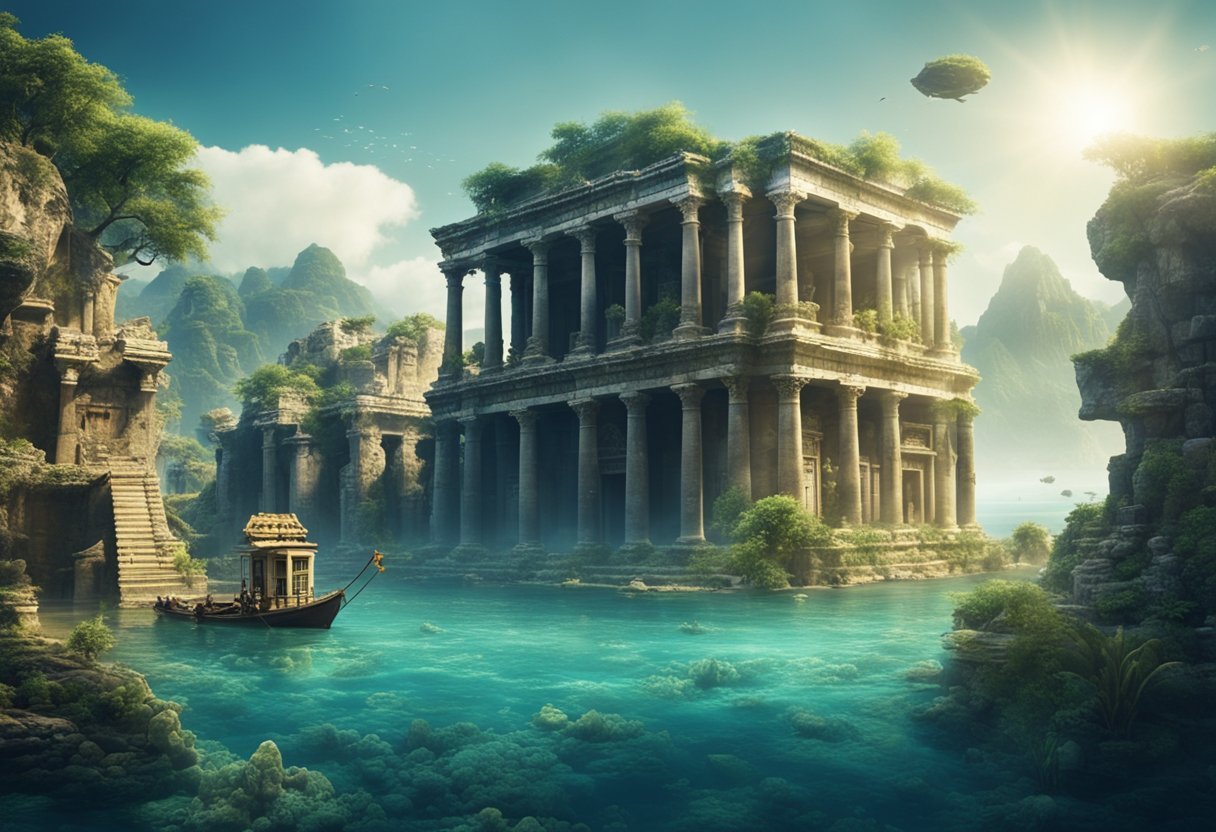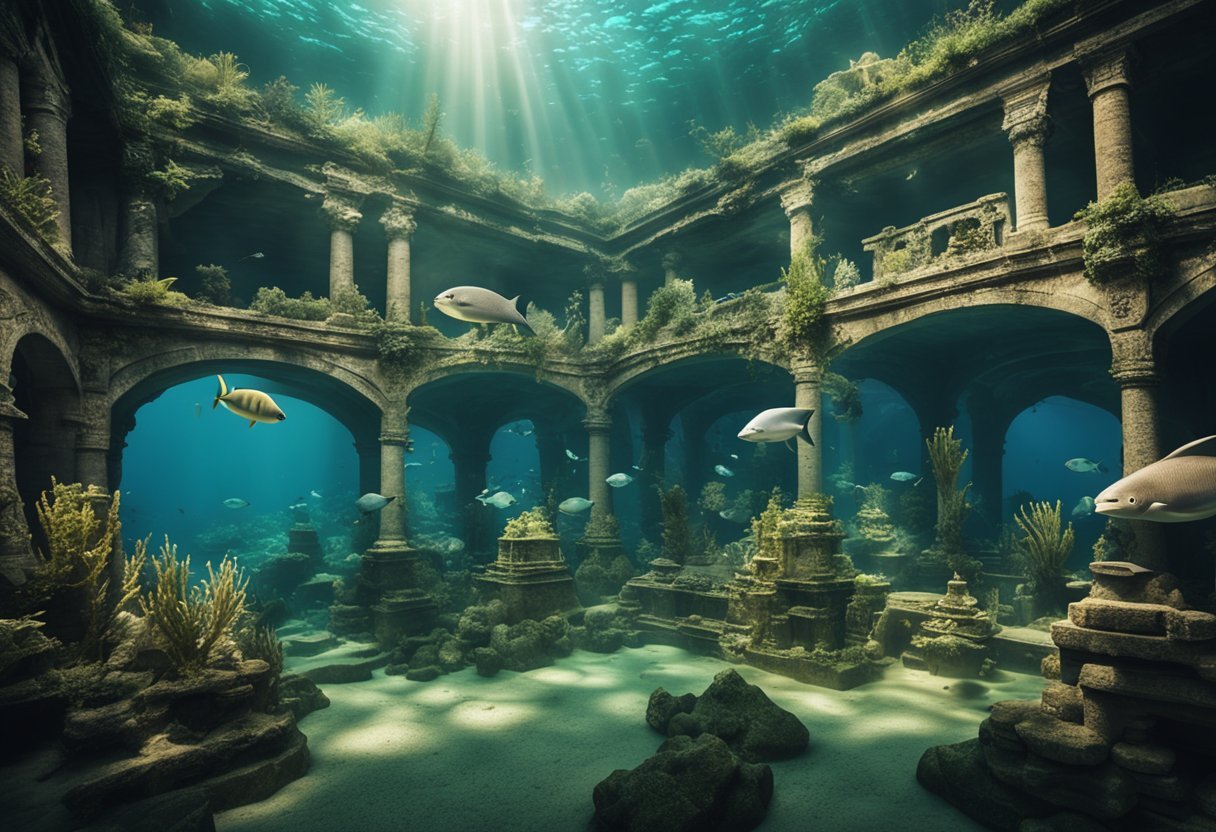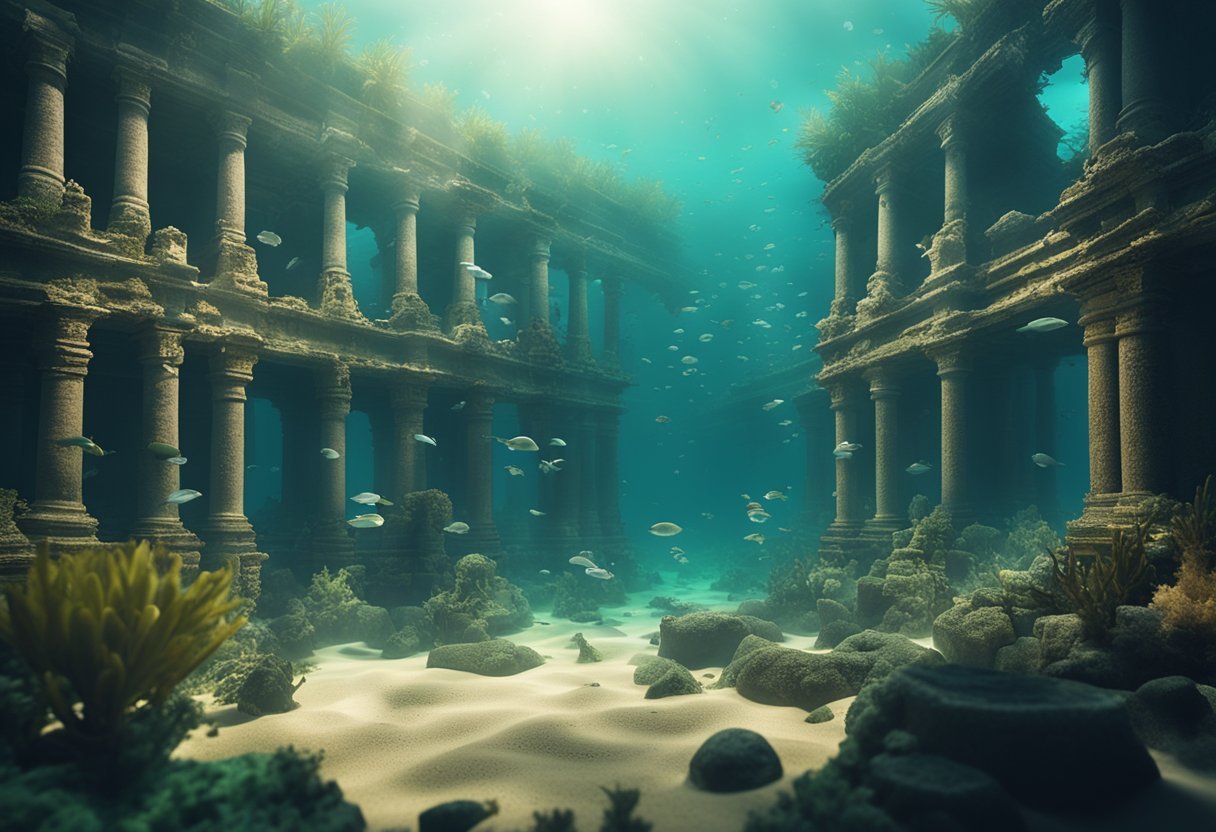The legend of Atlantis has captivated human imagination for millennia. This mythical island civilization, first described by Plato in his dialogues Timaeus and Critias, has sparked endless debate about its existence and location. While no conclusive evidence of Atlantis has been found, the story continues to inspire theories, archaeological searches, and esoteric interpretations.

Ancient texts provide tantalizing details about Atlantis, describing an advanced society with impressive technology and architecture. Some scholars suggest Plato’s account may have been inspired by real ancient civilizations, such as Minoan Crete or Bronze Age cultures in the Mediterranean. Modern theories range from plausible geological explanations to more speculative ideas linking Atlantis to extraterrestrial visitors.
In esoteric circles, Atlantis holds significant symbolic value. It represents a lost golden age of wisdom and spiritual enlightenment. Many occult traditions incorporate Atlantean lore into their teachings, viewing it as a source of ancient knowledge and mystical truths.
Key Takeaways
- Atlantis remains unproven but continues to fascinate scholars and the public alike.
- Ancient texts and modern theories offer diverse interpretations of Atlantis’ possible existence.
- Esoteric traditions view Atlantis as a symbol of lost wisdom and spiritual enlightenment.
Historical Context of Atlantis

The legend of Atlantis originated in ancient Greece, rooted in philosophical discussions and influenced by Egyptian lore. Plato’s writings provide the primary source for this mythical civilization, while earlier interactions between Greek and Egyptian cultures shaped its narrative.
Plato’s Dialogues: Critias and Timaeus
Plato introduced Atlantis in his dialogues “Timaeus” and “Critias,” written around 360 BCE. These works form part of his larger philosophical corpus, utilizing the Socratic method to explore complex ideas.
In “Timaeus,” Plato briefly mentions Atlantis as an island nation that existed 9,000 years before his time. The “Critias” dialogue elaborates on this, describing Atlantis as a powerful maritime empire located beyond the Pillars of Hercules in the Atlantic Ocean.
Plato portrays Atlantis as a utopian society that eventually became corrupt and imperialistic. He claims it was defeated by ancient Athens before sinking into the sea due to natural disasters.
Solon’s Egyptian Influence
Plato attributes the Atlantis story to Solon, an Athenian statesman who visited Egypt around 590 BCE. According to Plato, Egyptian priests shared the tale with Solon during his travels.
This connection to Egypt lends credibility to the narrative within the context of Greek thought. The Egyptians were renowned for their ancient wisdom and historical records, making them a respected source of knowledge in the Mediterranean world.
Solon’s alleged encounter with Egyptian priests highlights the cultural exchange between Greece and Egypt during the 6th century BCE. This interaction influenced Greek philosophy and mythology, potentially shaping the Atlantis legend.
Mythological Underpinnings and Geographic Speculation

The legend of Atlantis intertwines divine origins with specific geographical features. Ancient texts provide clues about its mythical founders and possible location, sparking centuries of debate and speculation.
The Deities: Poseidon and Cleito
Poseidon, god of the sea, played a central role in Atlantis’s mythical creation. He fell in love with a mortal woman named Cleito, who lived on an isolated island.
To protect her, Poseidon created concentric rings of land and water around her home. This became the foundation of Atlantis.
The divine couple had five pairs of twin sons. The eldest, Atlas, became the first king of Atlantis and gave his name to the surrounding ocean and mountains.
Poseidon’s involvement imbued Atlantis with divine authority, explaining its supposed technological and cultural superiority over other civilizations.
Geography of Atlantis and the Pillars of Hercules
Plato’s dialogues describe Atlantis as a large island located beyond the Pillars of Hercules. These pillars were likely the Strait of Gibraltar, marking the boundary between the Mediterranean Sea and the Atlantic Ocean.
The island allegedly contained:
- A central acropolis on a hill
- Concentric rings of land and water
- A vast plain for agriculture
- Mountains rich in resources
Many theories place Atlantis in the Atlantic Ocean, while others suggest locations in the Mediterranean or even other parts of the world.
The Atlanteans supposedly controlled a vast maritime empire, extending their influence across large parts of Europe and Africa.
Theories of Atlantis’ Existence

Numerous theories attempt to explain the existence and location of Atlantis. These range from speculation about real ancient civilizations to more fantastical claims rooted in pseudohistory.
Ignatius L. Donnelly’s Influence
Ignatius L. Donnelly’s 1882 book Atlantis: The Antediluvian World popularized modern Atlantis theories. Donnelly proposed that Atlantis was a real advanced civilization destroyed by a cataclysmic event.
He argued that Atlantis was the source of all human cultures and technologies. Donnelly’s work, though lacking scientific evidence, inspired many subsequent Atlantis theorists and researchers.
His ideas continue to influence pop culture depictions of Atlantis as an advanced prehistoric civilization.
Atlantis: A Reflection of Real-World Events?
Some scholars suggest Plato’s Atlantis story may have been inspired by real historical events. One theory proposes that Atlantis was based on the Minoan civilization of Crete, which declined after the eruption of Thera around 1600 BCE.
Others link Atlantis to the Black Sea deluge hypothesis, which posits a catastrophic flood around 5600 BCE. These theories attempt to ground the Atlantis myth in actual natural disasters and cultural memories.
However, there is no conclusive archaeological evidence supporting the existence of Atlantis as described by Plato.
Evaluating Pseudohistory and Pseudoarchaeology Claims
Many Atlantis theories fall into the realm of pseudohistory and pseudoarchaeology. These claims often lack scientific evidence and rely on speculation or misinterpretation of ancient texts.
Common pseudoarchaeological arguments include:
- Atlantis was an alien civilization
- It possessed advanced technology like crystals or antigravity
- The continent sank into the ocean intact
Mainstream archaeologists and historians reject these claims due to lack of physical evidence and inconsistencies with known historical facts.
Evaluating Atlantis theories requires carefully examining the evidence and claims against established archaeological and geological knowledge.
Evidence and Search Efforts

Numerous archaeological sites and natural disasters have been linked to the Atlantis legend. Modern expeditions continue to search for evidence of this lost civilization in various locations around the world.
Archeological Sites and Natural Disasters
The Minoan civilization on Crete has been proposed as a possible inspiration for Atlantis. The ancient city of Akrotiri on Santorini, buried by a volcanic eruption around 1600 BCE, offers intriguing parallels.
Some researchers point to the Santorini eruption as a potential cause of Atlantis’ destruction. This massive volcanic event triggered tsunamis and may have led to the decline of Minoan culture.
The Bimini Road, an underwater rock formation near the Bahamas, has attracted attention from Atlantis seekers. However, most scientists view it as a natural geological feature.
Modern Expeditions Searching for Atlantis
Numerous expeditions have scoured the Atlantic Ocean and Mediterranean Sea in search of Atlantis. Advanced technologies like sonar and satellite imaging have been employed to map the seafloor and identify potential underwater ruins.
Notable searches have focused on areas such as:
- The Straits of Gibraltar
- The island of Cyprus
- The Bimini area in the Bahamas
- Off the coast of Cuba
While these expeditions have uncovered interesting underwater formations and artifacts, no definitive evidence of Atlantis has been found.
Atlantis in Culture and Reflection

The myth of Atlantis has captured imaginations for centuries, inspiring works of art, literature, and esoteric thought. Its enduring appeal lies in its ability to reflect human desires and fears about lost knowledge and advanced civilizations.
Influence on Literature and Popular Culture
Atlantis has been a recurring theme in literature since Plato’s original dialogues. Francis Bacon’s 1627 novel “New Atlantis” envisioned it as a utopian society with advanced scientific knowledge. Jules Verne featured Atlantis in his 1870 novel “Twenty Thousand Leagues Under the Sea.”
In modern pop culture, Atlantis appears in comics, films, and TV shows. DC Comics’ Aquaman hails from an underwater Atlantis. Disney’s 2001 animated film “Atlantis: The Lost Empire” reimagined the lost city of Atlantis as a technologically advanced civilization.
The concept of Atlantis often serves as a metaphor for lost wisdom or an ideal society. It reflects humanity’s fascination with ancient mysteries and the possibility of advanced prehistoric civilizations.
The Legacy of Atlantis in Esoteric Thought
In esoteric circles, Atlantis is viewed as more than just a myth. Many believe it was a real advanced civilization with spiritual and technological knowledge surpassing our own.
17th-century scholar Athanasius Kircher proposed that Atlantean survivors spread their wisdom to other cultures after their island’s destruction. This idea influenced later esoteric thinkers who saw Atlantis as a source of ancient wisdom.
Some esoteric traditions claim to preserve Atlantean knowledge. They associate Atlantis with concepts like sacred geometry, crystal healing, and advanced energy manipulation. These beliefs reflect a desire to reconnect with a perceived golden age of spiritual and scientific understanding.
Frequently Asked Questions

The legend of Atlantis continues to captivate imaginations worldwide, sparking countless debates and theories. These questions address key aspects of the Atlantis myth, from its origins to modern interpretations.
What are the primary sources that describe the legend of Atlantis?
The primary source for the Atlantis legend is Plato’s dialogues, specifically “Timaeus” and “Critias.” These works, written around 360 BCE, provide the first known detailed account of Atlantis.
Plato describes Atlantis as a powerful island nation that existed 9,000 years before his time. He presents it as a technologically advanced civilization with a complex societal structure.
How has the myth of Atlantis influenced contemporary esoteric beliefs?
The Atlantis myth has significantly impacted various esoteric and New Age beliefs. Many groups view Atlantis as a highly advanced spiritual civilization with access to profound wisdom and technology.
Some esoteric traditions claim Atlanteans possessed psychic abilities and advanced energy manipulation techniques. These beliefs often intertwine with concepts of human evolution and spiritual awakening.
What are the prevailing theories regarding the potential location of Atlantis?
Numerous locations have been proposed as the site of Atlantis. Popular theories include the Mediterranean Sea, particularly the island of Santorini, which experienced a catastrophic volcanic eruption around 1600 BCE.
Other proposed locations include the Atlantic Ocean, the Caribbean, and even Antarctica. Each theory attempts to align geographical features with Plato’s descriptions.
Can archaeological findings support the existence of an Atlantean civilization?
While no conclusive archaeological evidence supports Atlantis’s existence, some findings have been linked to the legend. Underwater structures off the coast of Cuba and in the Bimini area have sparked interest.
Ancient sites like Göbekli Tepe in Turkey, dating back to 10,000 BCE, challenge our understanding of early civilizations. These discoveries fuel speculation about advanced ancient societies.
How has the story of Atlantis evolved from its classical origins to modern interpretation?
The Atlantis narrative has undergone significant transformations since Plato’s time. Renaissance scholars revived interest in the legend, often associating it with the discovery of the Americas.
Modern interpretations range from scientific hypotheses about ancient sea-level changes to fantastical depictions in popular culture. The story has become a flexible metaphor for lost golden ages and advanced civilizations.
What was Plato’s intention in depicting the story of Atlantis in his dialogues?
Scholars debate Plato’s purpose in introducing the Atlantis story. Some argue it was a philosophical allegory meant to illustrate his ideas about the ideal state and its potential downfall.
Others suggest Plato may have based the story on actual historical events, possibly combining various tales of natural disasters and lost civilizations known in his time.


